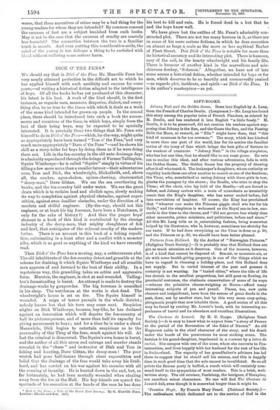GIFT-BOOKS.
this story among the popular tales of French Flanders, as related by N. Dentin, and has rendered it into English "a little freely." M. Devlin, it is to be presumed, did not caution his readers against sup- posing that Johnny is the Sun, and the Goose the Sun, and the Passing
Belle the Moon, or remark, as " Elia" might have done, that "this kind of nonsense is far too common." The story, which has kindred
in more then one part of the world, has for its motive the familiar notion of the irony of fate which brings the best gifts of fortune to the weakest of creatures. "Johnny Nett" is the village simpleton, who has but one idea, that he should like to eat roast goose. He sets out to realise this ideal, and after various adventures, falls in with the Golden Goose. The Golden Goose has the property of drawing after it all who touch it- The innkeeper's daughters, whose curiosity or cupidity leads them one after another to snatch at one of the feathers; the Vicar, who, scandalised at seeing Johnny with three girls in tow, plucks the youngest by the sleeve ; the Beadle, who tries to atop the Vicar; all the choir, who lay hold of the Beadle,—all are forced to follow, and Johnny arrives with a train of attendants so irresistibly comic that the King's daughter, who has never smiled before, fall into convulsions of laughter. Of course, the King has proclaimed that "whoever can make the Princess giggle shall win her for his Bride," and the simpleton is welcomed as the Royal son-in-law, suc- ceeds in due time to the throne, and "did not govern less wisely than other monarchs, prime ministers, and politioisne, before and since." All this Mr. Lang tells us in entertaining fashion, being somewhat ,, helped by his illustrator, who ,s, however, sometimes too sketchy for our taste. If he had done everything as the Vicar is done on p. 30, and the Princess on p. 36, we should have been better pleased. Pictures from Holland. By the Author of "Norwegian Pictures." (Religions Tract Society.)—It is probably true that Holland does not get as much attention as it deserves. One of the reasons, however, is of a kind that cannot be disposed of. Sea-air, or mountain-air, or air with some health.giving property, is one of the things which we have to regard in choosing a holiday-place, and this Holland does not supply. But in varied interest of the past and present it certainly is not wanting. Its "buried cities," where the tide of life has shrunk to the smallest proportions, but still goes on flowing, its provincial costumes, the obstinate conservatism of some of its ways —witness the primitive cheese-weighing at Hoorn—afford many interesting subjects of pen and pencil. Places, too, now quite obscure and insignificant, have been the scenes of great deeds in the past, done, not by another race, bat by this very same easy-going, phlegmatic people that now inhabits them. A good notion of all this may be found by reading Mr. Lovett's book, with its interesting ex- periences of travel and its abundant and excellent illustrations.























































 Previous page
Previous page